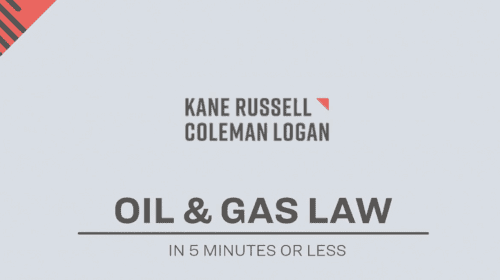The Court of Appeals in San Antonio recently decided one of the first cases in quite some time to address the duties—of the party with the executive rights to minerals—owed to non-executive mineral interest owners. The case is Texas Outfitters Limited v. Nicholson, No. 04-16-00392-CV.
Most of us in the industry know that in Texas and other jurisdictions the mineral estate (as distinguished from the surface) is comprised of what is often referred to as a “bundle of sticks.” There is the right to bonus money and royalty, for example. Interestingly, and sometimes vexing, is that fact that the right to receive royalties is generally a function of a mineral lease. Yet the right to negotiate and enter into a lease is not part and parcel of the royalty “stick” in the bundle. Rather, the right to lease is a separate right, one that can be stripped from the other sticks in the bundle, and even exist entirely on its own—when it is often called a “naked” executive right.
In any event, just to be clear, the executive right, or privilege, is the authority to lease oil, gas and other minerals for exploration, development and production.
As you might imagine, in those instances when the executive right is separated from the monetary incidents of mineral ownership, like royalties and bonus money, inevitably you will encounter clashing interests between the executive rights holder and the royalty owner. Clashes are often about (i) whether the executive should lease and, if so, (ii) when and (iii) on what substantive deal terms.
Prior to the recent Texas Outfitters opinion, there were two principal decisions—both out of the Texas Supreme Court—that addressed the duty of the executive to the non-executive. The first, from 2003, was In re Bass. There the Court concluded that the mineral executive is not charged with a duty to affirmatively lease. However, in the event the executive does choose to exercise its right, and signs a lease, then the executive must act with the “utmost fair dealing” toward the non-executive.
Almost a decade later, in Lesley v. Texas Veterans Land Board, the Texas Supremes retreated from their previous ruling in Bass and determined this time around that the executive could, in fact, breach its duty to the non-executive by failing to lease, or by taking actions that made it virtually impossible to consummate a lease.
So what, exactly, happened in Texas Outfitters?
- The Defendant, Texas Outfitters, bought a large range—some 1000 acres—from the Carter family. The purchase price was $1 million.
- The Carters owned half the minerals under the ranch, and another family (the Hindes) owned the other half.
- Critically for present purposes, as part of a subsequent transaction, the mineral owners conveyed to Texas Outfitters not just a small interest in the minerals (a little over 4%), but also the full executive rights to the entire mineral estate.
- Texas Outfitters went on to develop a hunting business on the ranch. Of course, now that the Defendant had a relatively small interest in the minerals and, conversely, a massive interest in the surface, the parties were on a collision course for conflict between (i) the surface owner and the owner of the executive rights, Texas Outfitters, and (ii) the super-majority owners of the minerals.
- In 2010, Texas Outfitters and the other mineral owners began receiving lucrative offers from a number of E&Ps to lease and develop the minerals beneath the ranch.
- The mineral owners, not surprisingly, very much wanted to lease, but Texas Outfitters apparently told them that the minerals would never be leased because the company wanted to keep the surface pristine, in order to ensure the vitality of the hunting business.
Later, Texas Outfitters tried to squeeze concessions out of the majority mineral owners in exchange for its exercise of the executive right to lease. Specifically, Texas Outfitters demanded that the mineral owners give up much of their interest in the oil and gas, such that Texas Outfitters’ interest would skyrocket from 4% to 25%.
The Carters—and, candidly, who can blame them—thumbed their noses at Texas Outfitters’ offer and instead filed a lawsuit against it for breach of its fiduciary duty, as the executive, to the non-executive mineral owners. After a bench trial, the judge determined that that Carters’ claims were valid and ordered Texas Outfitters to pay them nearly $900,000. This judgement basically represented the total amount of bonus money the Carters would have received from the soliciting operator if Texas Outfitters had agreed to lease the minerals.
On appeal, the Fourth Court in San Antonio issued an unequivocal affirmance, relying on the Supreme Court’s guidance from Lesley that “an executive can breach its duty by refusing to lease ‘[i]f the refusal is arbitrary or motivated by self-interest to the non-executive’s detriment.’” On this score, according to the appeals court, the trial judge correctly determined that, by declining to lease, Texas Outfitters was angling to get for itself “unfettered use of the surface for its hunting operation,” and “the ability to sell its land at a large profit free of any oil and gas lease.”
The Fourth Court was also none too happy with Texas Outfitters’ attempts to try to get the Carters to give up a large portion of their minerals in exchange for its consent to lease. Here’s what the Court had to say on this front: “The evidence supports an inference that Texas Outfitters refused to lease not only to protect its existing surface use, but also to exact a benefit from the Carters at their expense.”
Finally, Texas Outfitters tried to argue on appeal that the Carters “knowingly contracted for a situation in which they would have no say over when and how (or if) their minerals would be leased.” The San Antonio Court of Appeals was having none of this, however, stating in a tongue-in-cheek response that “it could also be said that Texas Outfitters knowingly contracted for a situation in which it would owe the Carters a fiduciary duty of utmost good faith and fair dealing if a mineral lease were offered.”
Tom is a litigation partner in the Houston office of Kane Russell Coleman Logan PC, where he serves as the head of the firm’s energy practice group. Tom is also the host of a weekly podcast on legal news and developments in the oil-and-gas industry, available at www.energylawroundup.com, and a video series on effective legal writing, available at www.theartofthebrief.com.
Tom is a litigation partner in the Houston office of Kane Russell Coleman Logan PC, where he serves as the head of the firm’s energy practice group. Tom is also the host of a weekly podcast on legal news and developments in the oil-and-gas industry, available at www.energylawroundup.com, and a video series on effective legal writing, available at www.theartofthebrief.com.













